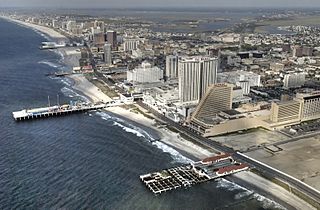
Smoking bans, or smoke-free laws, are public policies, including criminal laws and occupational safety and health regulations, that prohibit tobacco smoking in certain spaces. The spaces most commonly affected by smoking bans are indoor workplaces and buildings open to the public such as restaurants, bars, office buildings, schools, retail stores, hospitals, libraries, transport facilities, and government buildings, in addition to public transport vehicles such as aircraft, buses, watercraft, and trains. However, laws may also prohibit smoking in outdoor areas such as parks, beaches, pedestrian plazas, college and hospital campuses, and within a certain distance from the entrance to a building, and in some cases, private vehicles and multi-unit residences.

Walter Reed Gusciora is an American Democratic Party politician who has served as the mayor of Trenton, New Jersey since 2018. He previously served from 1996 to 2018 in the New Jersey General Assembly, where he represented the 15th Legislative District.

A smoking ban in England, making it illegal to smoke in all enclosed workplaces in England, came into force on 1 July 2007 as a consequence of the Health Act 2006. Similar bans had already been introduced by the rest of the United Kingdom: in Scotland on 26 March 2006, Wales on 2 April 2007 and Northern Ireland on 30 April 2007.

The Smoking Ordinance is a law in Hong Kong enacted in 1982 for smoking bans and regulation of sales of tobacco products. It has been amended several times ever since and the latest substantial amendment, known as the Smoking (Amendment) Ordinance 2006, was passed by the Legislative Council on 19 October 2006, and gazetted on 27 October 2006.

Cleopatra Gibson Tucker is an American Democratic Party politician, who has served in the New Jersey General Assembly since 2008, where she represents the 28th Legislative District.
The Smoke Free Illinois Act is a comprehensive anti-smoking law that took effect in Illinois on January 1, 2008, and bans smoking inside most buildings and vehicles used by the general public, used as a place of employment, or owned by the government or other public body. It also requires "no-smoking" signs, bans smoking within 15 feet (4.6 m) of openings in the targeted buildings and requires at least 75% of rooms in each hotel to be non-smoking. It replaced the more limited Illinois Clean Indoor Air Act.

The use of tobacco for smoking in New Zealand has been subjected to government regulation for a number of decades. On 10 December 2004, New Zealand became the third country in the world to make all indoor workplaces including bars and restaurants smoke-free.
DiAnne C. Gove is an American Republican Party politician who serves in the New Jersey General Assembly representing the 9th Legislative District. She was sworn in on December 7, 2009, to fill the vacant seat left by the resignation of fellow Republican Daniel Van Pelt after his arrest on corruption charges. She has been the Minority Policy Co-Chair in the General Assembly since 2014.

Smoking in Taiwan is regulated by the Tobacco Hazards Prevention Act (Taiwan). Tobacco advertising is banned, and smoking is banned in all indoor public places. Taiwan was the second Asian country to institute an indoor smoking ban, after Bhutan. The Government of Taiwan is planning to extend the smoking ban to cars, motorbikes, and pedestrians.

Tobacco smoking in Hong Kong has declined in recent decades, with 10 percent of Hong Kongers smoking on a daily basis as of 2017. It is the policy of the Hong Kong government to discourage smoking. Smoking is banned in most public places and tobacco advertising is prohibited.

SmokinginCanada is banned in indoor public spaces, public transit facilities and workplaces, by all territories and provinces, and by the federal government. As of 2010, legislation banning smoking within each of these jurisdictions is mostly consistent, despite the separate development of legislation by each jurisdiction. Notable variations between the jurisdictions include: whether, and in what circumstances ventilated smoking rooms are permitted; whether, and up to what distance away from a building is smoking banned outside of a building; and, whether smoking is banned in private vehicles occupied by children.
Smoking in Ireland is banned fully in the general workplace, enclosed public places, restaurants, bars, education facilities, healthcare facilities and public transport. However, it is permitted in designated hotel rooms and there is no ban in residential care, prisons and in outdoor areas. Public opinion is in favour of the bans on smoking imposed in Ireland.

Gambling in New Jersey includes casino gambling in Atlantic City, the New Jersey Lottery, horse racing, off-track betting, charity gambling, amusement games, and social gambling. New Jersey's gambling laws are among the least restrictive in the United States. In 2013, the state began to allow in-state online gambling. Five years later, the state won a lawsuit that dismantled Nevada's monopoly on legal sports betting.

Smoking in Costa Rica is still somewhat prevalent, and according to the Global Adult Tobacco Survey (GATS) in 2015, 8.9% of the population smoked tobacco. The number of people exposed to secondhand smoke indoors while at the workplace was 6.3% while 4.9% were exposed in their own home.
The Oregon Indoor Clean Air Act, also known as the Smokefree Workplace Law, is a measure passed in 1981 by the US State of Oregon prohibiting smoking in public indoor places except in certain designated smoking areas. The objective is to protect non-smokers in confined areas from second-hand smoke. Beginning on January 1, 2016, the law was extended to cover "inhalant delivery systems" such as e-cigarettes.
Clinton Calabrese is an American Democratic Party politician who has represented the 36th Legislative District in the New Jersey General Assembly since February 10, 2018, when he was sworn in to replace Marlene Caride, who resigned from office after being nominated to serve as head of the New Jersey Department of Banking and Insurance. Calabrese had served on the Board of Education of the Cliffside Park School District. He has been the Assembly's Deputy Whip since 2022.











